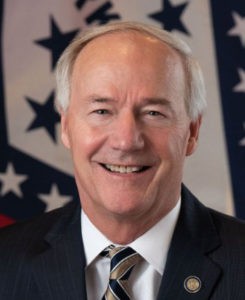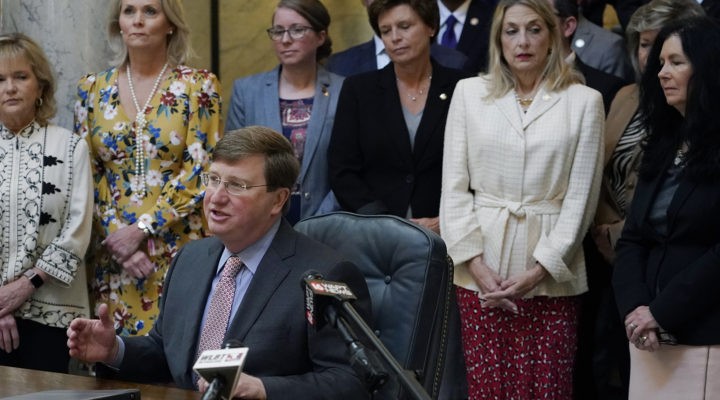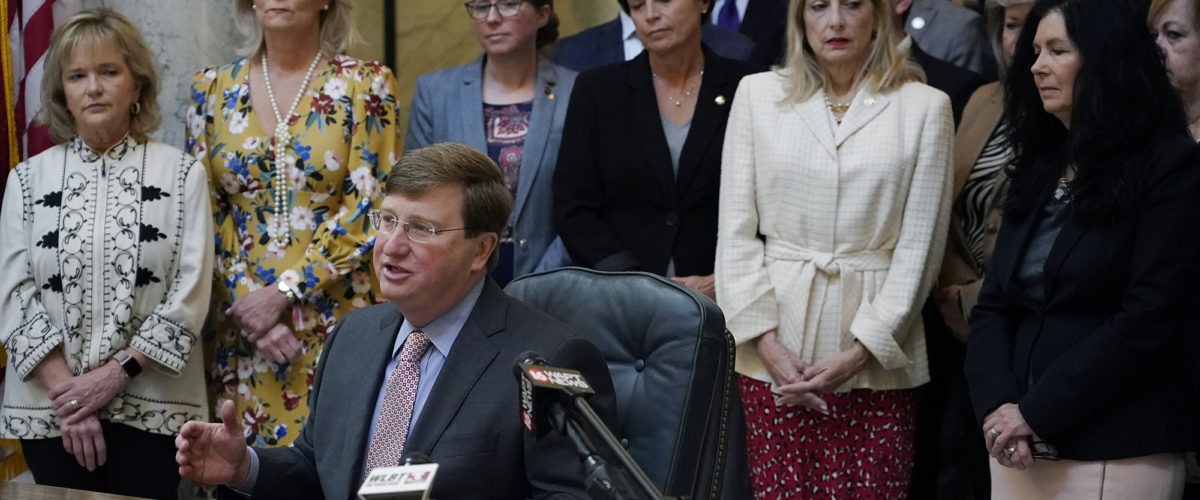Ensuring the absolute right of churches to meet during a global pandemic, amending religious freedom legislation and enacting legislation against transgender youth have emerged as key faith-based actions in state legislatures across the nation this year.
All three issues are driven mainly by conservative evangelicals who have fought against public health restrictions during the coronavirus pandemic, seek to redefine religious liberty to emphasize their own free exercise of religion, and who espouse a moral agenda that views the entire LGBTQ community as a threat to the divine order of creation.

Asa Hutchinson
Arkansas Gov. Asa Hutchinson made international headlines April 5 when he vetoed a bill (House Bill 1570) that would have made it illegal for transgender minors to receive gender-affirming medication or surgery. The New York Times called this “a rare Republican rejection amid the growing conservative effort to restrict transgender people’s health care and participation in society.”
This veto came just a little more than a week after Hutchinson signed into law another controversial bill that allows medical providers in Arkansas to deny non-emergency care to anyone based on the provider’s own moral or ethical standards — a law widely viewed as targeting the LGBTQ community.
“I was told this week that the nation is looking at Arkansas because I have on my desk another bill passed by the General Assembly that is a product of the cultural war in America,” Hutchinson said of his veto. “I don’t shy away from the battle when it is necessary and defensible, but the most recent action of the General Assembly, while well intended, is off course.”
Although the Arkansas Legislature could — and likely will — override the veto, pro-LGBTQ rights groups saw a glimmer of hope in Hutchinson’s action.
“It’s such an important rebuke of this sweeping range of legislation targeting trans youth across the country,”
“First and foremost, it’s such an important rebuke of this sweeping range of legislation targeting trans youth across the country,” Chase Strangio, a lawyer at the American Civil Liberties Union, told the Times. “I hope Alabama’s watching. I hope Tennessee’s watching.”
Coordinated effort on transgender bills
Bills in at least 20 states are targeting transgender students in athletics in what appears to be a coordinated multi-state approach by religious conservatives this session. This is part of a broader anti-trans agenda playing out in nearly 30 states this year.
The ACLU told CNN that the majority of anti-trans bills in state legislatures fall into two categories: removing trans girls’ ability to participate in girls’ sports, and restricting young trans peoples’ access to gender-affirming health care. Tennessee, Mississippi and Arkansas already have passed such legislation that has been signed by governors.
The ACLU is tracking 23 bills in 17 states that would restrict health care services for transgender youth and 52 bills in 29 states that would exclude transgender youth from athletics.
The Human Rights Campaign reports that more anti-transgender bills have been filed in states this legislative session than ever before.
Meanwhile, the Human Rights Campaign reports that more anti-transgender bills have been filed in states this legislative session than ever before. The combined total is 82 and rising, which compares to a total of 79 bills introduced in the 2020 sessions.
The Human Rights Campaign “has been tracking anti-transgender legislation across state legislatures for decades,” the organization said. “The legislative fight to pass discriminatory anti-transgender legislation this year has been fast and furious, led by national groups aiming to stymie LGBTQ progress.”
“These bills are not addressing any real problem, and they’re not being requested by constituents,” said Human Rights Campaign President Alphonso David. “Rather, this effort is being driven by national far-right organizations attempting to score political points by sowing fear and hate. What they don’t understand is opposing equality is highly unpopular — even among Trump voters — and states that pass legislation that attacks our community will face severe economic, legal and reputational harm.”
Who’s behind these bills?
The anti-trans bills in state legislatures not only follow the same themes but often employ near-identical language.
“These bills come from the same forces that drove previous anti-equality fights by pushing copycat bills across state houses — hateful anti-LGBTQ organizations like the Heritage Foundation, Alliance Defending Freedom (designated by Southern Poverty Law Center as a hate group), and Eagle Forum among others,” David said.
While not pitched in legislative terms as about religion, anti-trans legislation is widely propagated by conservative religious groups such as the Family Research Council, which describes its mission as championing “marriage and family as the foundational cornerstone of civilization, the seedbed of virtue and the wellspring of society.” Its website declares: “We believe that because God created us ‘male and female’ (Genesis 1:17), we have no right to re-create ourselves otherwise.”
While not pitched in legislative terms as about religion, anti-trans legislation is widely propagated by conservative religious groups.
One of the Family Research Council’s publications for parents advises: “Local church congregations are important social institutions in each community. Any effort to mobilize like-minded parents to express concern about school policies regarding human sexuality should not overlook the church. First, talk to your pastor about your concerns. Ask if the pastor would be willing to be a spokesman for community efforts, or to talk to the congregation in a worship service. If not, ask if you can be given time to make an announcement to enlist support.”
It continues: “The church can also be a good place to collect signatures on petitions to the school board or superintendent. Your church might also have an email newsletter or some other online resource that can be used to spread the word.”
Another religious purveyor of anti-trans ideology is the Council on Biblical Manhood and Womanhood, which has deep ties to current leadership of the Southern Baptist Convention, including three of the six SBC seminary presidents.
In a recent article, Executive Director Colin Smothers wrote: “The progressive Left has turned the very lives of our kids into a political and ideological battleground to wage its ill-conceived war against God and nature.”
He added: “While many seem to be rejoicing in a return to ‘normal’ after the transition from the Trump administration to the Biden administration, this is anything but normal. This is overt, high-handed sin against God and nature being promoted by our federal government against the most defenseless amongst us. We are failing the moral test and failing miserably. Weep for the children.”
COVID-inspired bills declare churches ‘essential’
A second trend in statehouses this year is legislation inspired by prohibitions on churches holding large in-person gatherings due to the potential spread of COVID-19. Such bills variously attempt to define houses of worship as “essential” businesses like grocery stores or to more strictly define religious liberty needs as greater than public health needs.
Such bills variously attempt to define houses of worship as “essential” businesses like grocery stores.
One such bill already passed and signed is House Bill 1211 in Arkansas. In nine pages of text, the bill restricts government from requiring churches to close for in-person gatherings during any kind of emergency.
The conservative Arkansas Family Council praised passage of the bill, saying it “ensures our government never closes churches during a disaster or other emergency.” Further, it “protects churches from being singled out during an emergency. It prevents the government from penalizing a church that meets during an emergency. And it requires churches to comply with the same basic health and safety standards as everyone else.”
The Arkansas chapter of American Atheists, meanwhile, dubbed the legislation a “Church Super-spreader Bill.”
In South Dakota, House Bill 1093 currently is under review in committee. It states: “Each municipality shall have power to do what may be necessary or expedient for the promotion of health or the suppression of disease, so long as, in the absence of an act of martial law having been declared, any measure so taken, including by ordinance or a resolution, does not prohibit or interfere with the free exercise of religion, abridge any person’s freedom of speech, or of the press, or of the right of the people to peaceably assemble, or of the right of the people to petition the government for a redress of grievances under the First Amendment to the United States Constitution, or prohibit or interfere with activities within any person’s residence or privately held business, or interfere with any person’s right to bear arms under the Second Amendment to the United States Constitution.”
Americans United for Separation of Church and State said it is currently tracking similar bills in at least 36 states.
“While AU recognizes the importance of religious freedom, the organization holds that during a deadly pandemic, officials must have the ability to take steps to protect the people. This may include restrictions on all types of mass gatherings, both religious and secular,” AU said in a statement. “These bills, by contrast, are designed to give houses of worship special treatment by allowing them to meet when comparable secular institutions are closed. Carve-outs like this will only make it harder to overcome the coronavirus or future pandemics.”
Among other states considering such legislation:
Arizona House Bill 2648 passed the House and is now under consideration in the Senate. It decrees that “during a state of emergency, religious services are declared an essential service and are deemed necessary and vital to the health and welfare of the public.”
A further twist in Arizona targets the right of clergy to make hospital visits even during a pandemic.
A further twist in Arizona targets the right of clergy to make hospital visits even during a pandemic. House Bill 2575 has passed House and is now under consideration in Senate. It states: “A hospital’s visitation policy must facilitate the ability of clergy to visit patients for religious purposes, including during a pandemic. In an end-of-life situation, a hospital must facilitate in-person clergy visitation regardless of the time of day. Clergy must comply with reasonable health and safety precautions imposed by hospitals in connection with clergy visitation.”
In California, which has been at the forefront of evangelical Christian opposition to church closures, Senate Bill 397 would prohibit government from enforcing any health, safety or occupancy requirement that imposes a substantial burden on a religious service unless the state or local government demonstrates that applying the burden to the religious service is essential to further a compelling governmental interest and is the least restrictive means of furthering that compelling governmental interest — language mirroring the federal Religious Freedom Restoration Act.
In Indiana, Senate Bill 263 has been passed by Senate and is now under consideration in the House. It would prohibit government from imposing “restrictions on a religious organization that are more restrictive than the restrictions imposed upon other businesses and organizations that provide essential services to the public.” It explicitly declares that no government or government official may “restrict the right of the people to worship or to worship in person during a disaster emergency.”
Similar bills are under review in Kentucky (House Bill 218), Montana (Senate Bill 172), New Hampshire (House Bill 542), South Carolina (House Bill 3105) and Oklahoma (Senate Bill 368).
Religious Freedom Restoration Act
The Oklahoma legislation would amend the Oklahoma Religious Freedom Act to say: “No governmental entity … shall declare or deem a religious institution and any activity directly related to the institution’s discharge of its mission and purpose to be nonessential. No religious institution shall be subject to a closure or restriction for the purposes of health or security that is greater than that imposed upon any private entity facing the same or similar health or security conditions.”
Declaring religious worship to be essential through an amendment to the state’s Religious Freedom Restoration Act is a slightly different approach for Oklahoma, but other states this session are introducing or modifying their own versions of RFRA with a view toward ensuring more free exercise of religion.
Other states this session are introducing or modifying their own versions of RFRA with a view toward ensuring more free exercise of religion.
The federal version of RFRA, which was shepherded through Congress with leadership by Baptist Joint Committee for Religious Liberty, set a standard for when government may legitimately restrict religious practice for a “compelling” reason that uses the “least restrictive” means possible.
About half of all states have since adopted their own versions of RFRA. But those laws, like the federal version, have come under attack from both the right and left in recent years. The conflicts often have to do with what’s required of faith-based schools and nonprofits that receive government funding or referrals.
The ACLU is tracking 10 bills in eight states seeking to establish Religious Freedom Restoration Acts this session.
Some Arkansas legislators seek to amend the state’s version of RFRA through House Joint Resolution 1024.
The bill asserts that even federal and state laws deemed “neutral” toward religion “may burden religious exercise as surely as laws intended to interfere with religious exercise.” Its language declares the purpose of the amendment is to “guarantee that the freedom of religion is not burdened by state and local law” and “provide a claim or defense to persons whose religious freedom is burdened by government.”
New Jersey is one of the states without its own version of RFRA. In the state’s General Assembly, Bill 3766 would create the New Jersey Religious Freedom Restoration Act. Its language is modeled on a bill previously adopted in Florida.
So far in this legislative session, South Dakota is the only state to adopt a new RFRA bill.
So far in this legislative session, South Dakota is the only state to adopt a new RFRA bill. There, Senate Bill 124 was signed by Gov. Kristi Noem March 10. Notably, this is the first new state-level RFRA legislation passed in six years.
The South Dakota act states that government may not “substantially burden a person’s exercise of religion unless applying the burden to that person’s exercise of religion in a particular situation is essential to further a compelling governmental interest and is the least restrictive means of furthering that compelling government interest.”
It adds, however, a COVID-inspired provision that the state must not “treat religious conduct more restrictively than any secular conduct of reasonably comparable risk” or “treat religious conduct more restrictively than comparable secular conduct because of alleged economic need or benefit.”
Related articles:
Equality Act stirs passions about the definition of religious liberty and RFRA’s role
If court reverses same-sex marriage it will do so against what majority of Americans want
Does landmark religious freedom legislation need a fix or is it fine as is?
How the nuns won at the Supreme Court and why it matters
Supreme Court again overturns COVID restrictions on houses of worship


